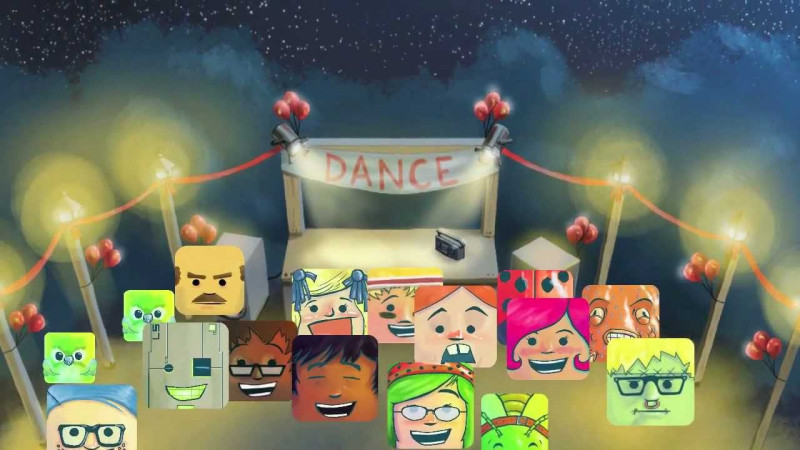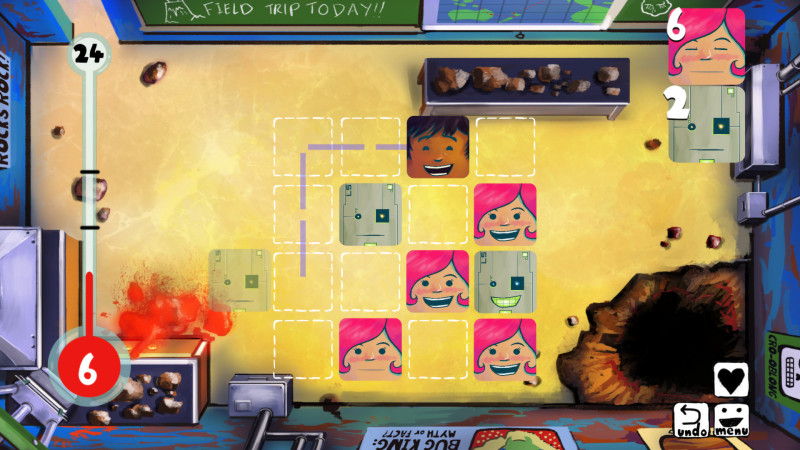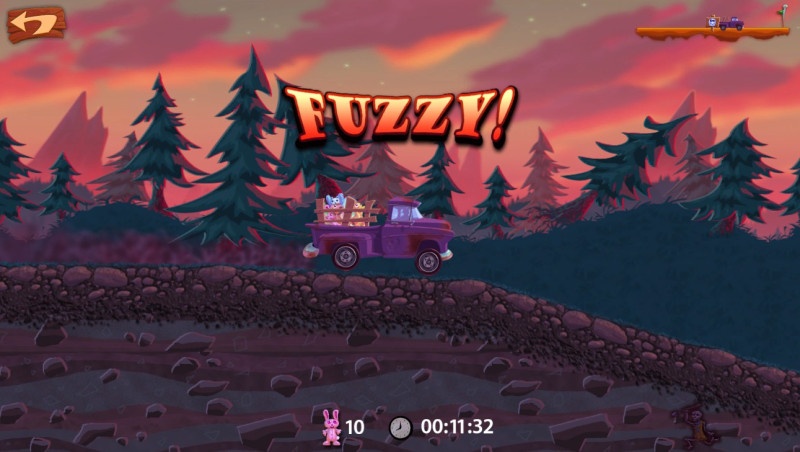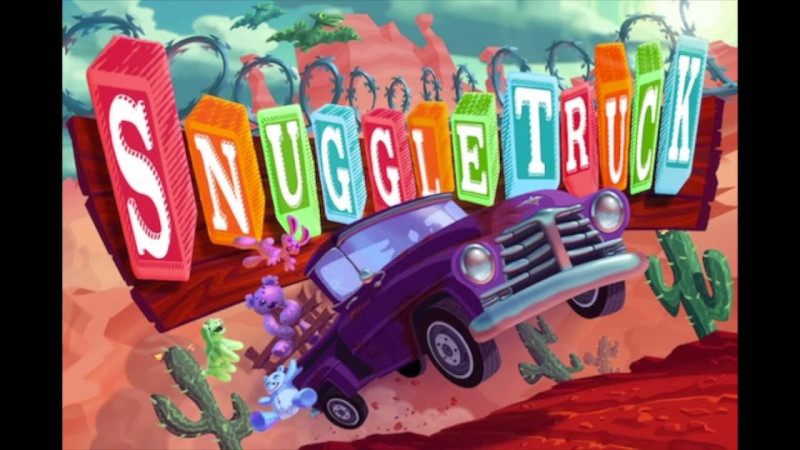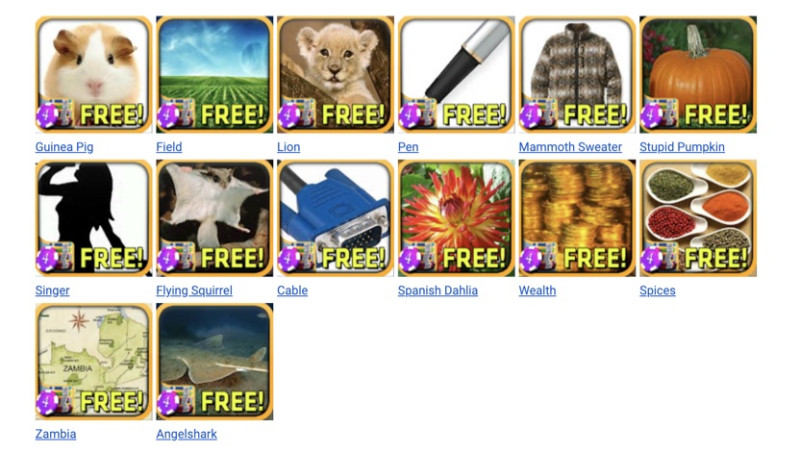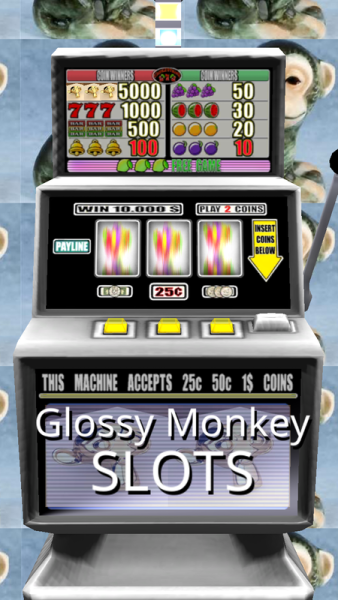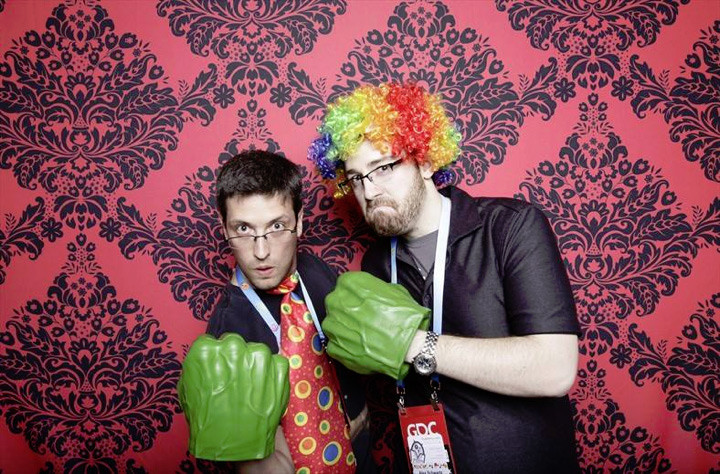


Mobile games were supposed to be an indie developer nirvana. When the iPhone debuted in 2007, Apple pitched consumers on the promise of an endless stream of tiny creative games and other productivity applications. Indie developers immediately recognized the market’s potential: A small team of developers could release their experimental projects to millions of users at a low price and reap large rewards. Early mobile hits like Words with Friends, Fruit Ninja, and Temple Run seemed to confirm this notion, and those titles helped their developers amass significant nest eggs.
Then the gold rush happened, and the mobile market metastasized into something ugly. App stores overflowed with ad-driven, free-to-play games that catered to the lowest common denominator. Mobile game development became financially unsustainable for many. In the midst of this mobile “indiepocalypse,” two friends found success in an unlikely place. Their secret: Make a thousand bad games.

In 2013, Alex Schwartz and Ziba Scott joined a shared workspace co-op in Boston while independently pursuing careers in game development. Both designers had shifted to the mobile space with the dream of making their big break in the industry. After their first meeting, they quickly bonded over the struggle to realize that dream.
Schwartz had attended college for game design before landing a job at Seven45 Studios working on a failed Rock Band clone called Power Gig: Rise of the SixString. After its release, Schwartz set off on his own and formed Owlchemy Labs, the indie studio that released the racing smuggler game Snuggle Truck as well as the early VR standout Job Simulator.
Scott, on the other hand, worked for seven years as a Linux consultant and web developer when he decided that making games was more fulfilling. After earning a master’s degree in serious game design from Michigan State University, Scott secured a publishing deal with Adult Swim Games for his puzzle game Girls like Robots. By the time Schwartz and Scott met, they had both signed contracts with big publishers and released creative indie titles to favorable reviews. And yet, both designers still struggled to make ends meet.
“We always felt like if we could do something that was creatively fulfilling, and we made enough money on game number one to fund game number two, then that was top-tier success,” Schwartz says. “We played the multiplatform hustle, where if you make something in Unity you can put it anywhere, and it wasn’t working. The dream wasn’t ‘Oh man, I hope we can be kings of mobile.’ We were just chasing platforms, and we were watching the concept that people would spend three dollars on a premium mobile game nosedive super hard.”
We played the multiplatform hustle, where if you make something in Unity you can put it anywhere, and it wasn’t working..."
“It was 2013 when it became clear that that premium mobile market was dying,” Scott adds. “It was becoming a strange beast. Even now, you can’t follow the successes from two years ago. You can’t follow those rules because the industry is constantly changing. That was something we were learning. I think both of us felt like we were a year or two too late to release a three-dollar game or even a five-dollar game on iOS that would even make its money back.”
Half a decade after the release of the iPhone, the mobile market was awash with clones, reskins, and other low-effort shovelware. In some cases, the clones were actually making more money than the originals, which famously happened to number-based puzzle game Threes in 2014. Schwartz and Scott felt that it was nearly impossible for the average game developer to get noticed without a million-dollar marketing budget. As young indie developers struggling to pay the rent, Schwartz and Scott were growing disillusioned.
Then they had a crazy idea. If the system had stopped working for them, maybe they could just work the system.
Every January, MIT helps host the Global Game Jam, the world’s largest game jam, which takes place at multiple locations around the world. While teams of programmers and artists beat their heads trying to come up with one “perfect idea,” Schwartz and Scott giggled in a corner and asked themselves, “How can we do worse?”
The two developers had often joked about how they could reskin and clone their own games and flood the mobile marketplace. Now they were ready to actually do it. But first, they needed to make a game that was incredibly simple and easy to clone. Schwartz and Scott never intended to spend a lot of time or effort on a project like this. Cutting corners was not only encouraged, it was a mantra. Ultimately, the designers decided that they didn’t even need to make the game themselves – they could just download and repackage some prebuilt program off the Unity Asset Store. Reskinning and cloning a game they hadn’t even made felt like one gigantic corner to cut. It was perfect. Schwartz and Scott hopped online and bought a slot-machine game for $14.99. The duo didn’t know it yet, but they would eventually see a massive return on that investment.
“Slot-machine games seemed like the perfect fit, because they have such a low barrier to entry,” Scott says. “There aren’t many games simpler than pressing a button that says good or bad. You can hardly abstract the concept of a game any further -than -that.”
“Slot-machines are the one world where there is already an entire industry built around reskins, and no one gives a s---,” Schwartz adds. “Walking through Vegas, you see hundreds of different slot-machines. You walk past Cleopatra slots and then Wheel of Fortune slots, there are even Fruit Ninja slots. It’s such a weird world that we didn’t understand, but we knew that humans seem drawn to them in some way.”
Once Schwartz and Scott had a working game, they set to work making copies. They added new background images, in-game “about” descriptions, and a custom theme song. Their slot games were of admittedly low quality, but they had taken less than an afternoon to cobble together. Future clones would take only a fraction of that time.
Scott wrote a Unity editor script that automatically grabbed images off the web, swiped an about blurb from Wikipedia, and then used a text-to-speech program to generate new lyrics to their electronic theme song. At this point, all Schwartz and Scott had to do was type a theme into their Unity editor and the program would spit out a new slot-machine. Before long, they had dozens of slot games with titles as absurd as Lobster Slots, Richard III Slots, and Harlem Shake Slots.
The designers then took the hundred-plus games they had made and published them onto the Google Play store. They marveled at the fact that a few people actually downloaded them and laughed over the smattering of bad reviews. At this point, Schwartz and Scott’s silly experiment seemed like a success. They didn’t know what it proved, but releasing a glut of low-quality games onto Google’s marketplace felt like a snarky middle finger to the industry and its rising tide of low-quality content that was drowning out premium mobile products dedicated developers had poured their blood, sweat, and tears into. Their curiosity satisfied, Schwartz and Scott walked away and forgot about their little experiment.
Over the next several months, while quietly unobserved, their games continued to accrue downloads.
After the Christmas break of 2013, Schwartz and Scott returned to check up on their slot-machine experiment. They were startled by their discovery. All of Schwartz and Scott’s games were free to download, but like most free games, these slot games featured integrated advertising. It was almost a joke. One of the most annoying aspects of the mobile market were the “gacha” free-to-play games that roped players into watching one ad after another for another spin at the wheel. Schwartz and Scott were trying to mock those types of games; they hardly expected to make money on the ads in their own crappy games.
“A lot of times app stores have a bump over the holidays and we wondered what happened,” Schwartz says. “We saw that our downloads had gone way up, but then we checked our ad network backend and saw that in January and throughout the holidays we were making over $200 a day.”
“It’s hard not to look at a few hundred bucks a day that took no work and not draw a line from $200 to millions twinkling in our eyes somewhere,” Scott says.
Schwartz and Scott didn’t need any more encouragement to fire up their automated workshop again. But this time, they were ready to take things to the next level, so they incorporated under the name Signal to Noise. The pair even came up with a cutesy tagline, “We are the noise.”
Making slot games was a snap, but there were a few speed bumps to Schwartz and Scott’s automated system. It took several minutes to fill out all the forms to submit a game for publishing on Google’s App store, and the pair still had to sit down and brainstorm new themes for future slot games. Sure, typing in a new theme took seconds, but they felt that even this process could be automated.
To solve the first problem of submitting games for publishing, Scott used a web-automation tool that played back browser-based interactions. This allowed him to record the inputs for filling out the developer agreements needed to submit a game to Google’s Play Store. To solve the second problem of generating ideas, Schwartz and Scott had Google Trends feed their system relevant news and celebrity gossip, which resulted in games likes Deer Antler Spray Slots and John Boehner Slots. Next, they downloaded massive lists of words and coded a formula that took random adjectives and paired them with random nouns. This program spit out a stream of nonsensical slot-machine ideas like Stupid Pumpkin Slots, Tremendous Face Pain Slots, and Inexperienced Great Horned Owl Slots. “We had reduced the gap between conceiving a game to publishing it to market to typing a single word and hitting enter,” Scott says.
After a few months of tinkering, Schwartz and Scott had developed an automated system that could be accessed via Wi-Fi from any country in the world. They had visions of sipping drinks on the beach while periodically checking in on their slot-machine empire. The duo nicknamed their system The Goose, as in the fabled bird that laid golden eggs. Before long, The Goose was churning out and publishing games at an insane clip. In fact, Schwartz and Scott were amassing more games than they could ever publish; Google actually restricts developers from publishing more than 15 games a day. But even with this artificial restriction, after its first year Signal to Noise had already submitted nearly 750 games to the Google Play Store. Most games only got a few hundred to a thousand downloads, but even the least successful slot-machines contributed to Signal to Noises’ overall downloads, and ultimately ad impressions.
We had reduced the gap between conceiving a game to publishing it to market to typing a single word and hitting enter,” Scott says.
“One month, we looked at the drip income of Owlchemy’s entire portfolio,” Schwartz says. “I remember that Slots, this low-effort garbage pile, was somehow bringing in more money than the past four years of my creative endeavors. That was a real laugh-while-crying kinda moment. I went, ‘What the f--- are we doing with our lives if this joke has started to supersede true effort?’ … I almost didn’t want it to make money, because it proved that it’s more effort to make games the right way. There was a feeling of it shouldn’t be this easy, because it proves that, as a society, people are not as discerning with quality as we had hoped.”
On a good month, Schwartz and Scott wouldn’t even interact with The Goose and they could watch the ad revenue roll in. But eventually, The Goose always needed attention. Schwartz and Scott had built a fragile scaffolding with several points of failure. Their entire automated system relied on over a dozen different online services, from Google to Wikipedia to small web-based freeware. When Google Images caused problems for their automated system, they had to switch over to Bing’s image search. When Google Play required game submissions to include high-res images, they had to update their photo capture system. When Unity changed its privacy policy, a country altered its laws on gambling apps, or a checkbox on Google’s publishing forms shifted even 10 pixels to the left, The Goose would grind to a halt and the system had to be updated. Fixing these problems was rarely complicated, but The Goose needed the-occasional greasing.
The bigger issue was that Signal to Noise had started as a joke, but it had grown into something larger – something unfulfilling. “I was constantly torn between pride and amusement and a sense that I should be doing something else,” Scott says.
“There was a joke here, where if the mobile market was more sustainable for premium content, then we wouldn’t have had to lower ourselves to following through on this joke idea,” Schwartz adds.
When Google started to implement systems that made it difficult for cloners like Signal to Noise, Schwartz and Scott ultimately decided to walk away from their project. On March 19, 2017, after more than four years, 1,500 slot-machine games, and over 1.6 million downloads, Signal to Noise published its last game: 3D Astronomer Slots – Free.
To be clear, Schwartz and Scott didn’t shut down their automated system, they just stopped updating it and let The Goose die a slow death. They left the keys in the car and let it slowly roll into a ditch. Surprisingly, The Goose lived far longer than either Schwartz or Scott had expected. Today, Signal to Noise’s entire portfolio of games has been suspended by Google for failure to keep up with the latest updates. Even so, as of this printing, Schwartz and Scott are still scraping in a small amount of ad revenue from users who occasionally fire up the apps still lingering on their phones.
Fortunately, these days, Schwartz and Scott don’t have to play the slot game to make money, and both developers have found some of the indie development success they yearned for. In 2016, Scott used Fig to successfully crowdfund Make Sail, a physics-based construction adventure, and the game is currently in early access. Meanwhile, in 2017, Schwartz’s company Owlchemy Labs was purchased by Google, and Schwartz has spun off once again to form another, currently unnamed, indie game company.
Both Schwartz and Scott say Google has made it more difficult for developers to flood the market with the types of automated clones that they released, but that doesn’t mean the mobile market has become more friendly to developers, or users for that matter. App stores are still brimming with clones and ad-driven shovelware that make it hard for premium titles to be discovered. This problem isn’t localized to the mobile space, either. As online stores like Steam continue to open up and make it easier for anyone with a computer to publish software to the platform, developers will continue to find ways to exploit those systems.
“It’s interesting how this experiment tied into my ideas on curation,” Schwartz says. “This is the logical outcome to a completely open, uncurated platform. Quality goes down, people think of various schemes to flood the market, and consumers are left with a low-quality experience overall. I feel very passionately that consumers should have a curated experience. So this was us jumping over the tiniest of tiny fences to go muck around in an open ecosystem to show people how bad things are, and how bad they can be.”
If Schwartz is to be believed, then maybe the problem isn’t with the kinds of developers who churn out endless clones and other low quality software. And the problem might not be the consumers who find themselves lost in a sea of likeminded apps that constantly demand their eyeballs. The problem is likely the systems platform holders have built that allow for this level of exploitation. Some developers are trying to stem this tide. Valve has taken a player-driven approach to discoverability, allowing user reviews and trends to drive many of Steam’s algorithms, but as more new games flood the market, developers continue to complain about getting lost in the sea. Online stores are full of garbage, but who’s cleaning up the trash?
This was us jumping over the tiniest of tiny fences to go muck around in an open ecosystem to show people how bad things are..."
If anything, experiments like Signal to Noise expose the inefficacies of our current online markets, and offer a peek into one potential future where automation spirals out of control.
Today, the internet is crawling with automated bots that do everything from sending emails to leaving consumer reviews to responding to Twitter comments. It’s easy to get lost in the cacophony. Tomorrow, bots are already learning how to make, publish, and even promote games. What happens next is still up to us.
This article originally appeared in the June 2019 issue of Game Informer.
